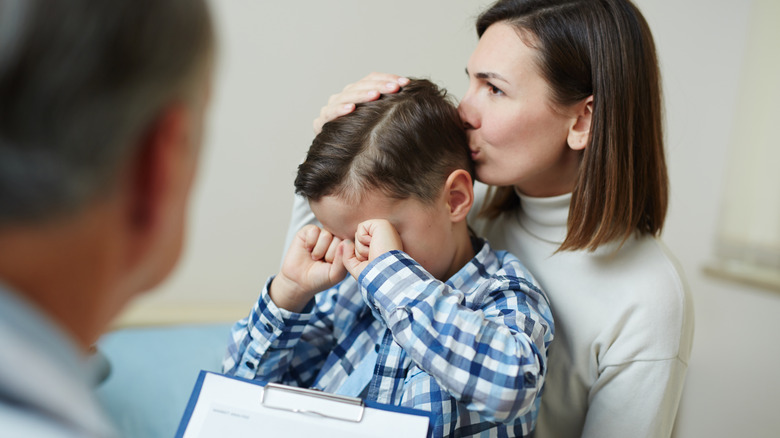Pediatric Nurse Shares Top Tips To Ease Kids' Fears When Visiting The Doctor
While crucial for maintaining our health and wellness, a visit to the doctor can be a scary experience. This can certainly be true for adults, but a doctor's appointment can be especially fear-inducing for kids, in particular. In an exclusive interview, Health Digest spoke with Dr. Andrena Zeigler, a board-certified pediatric nurse practitioner and pediatric mental health specialist with more than twenty years of experience in both acute and primary care. As the author of two children's books centered around reducing kids' fears of doctor's visits and vaccine shots, Dr. Zeigler has in-depth knowledge of where these fears stem from and how caregivers can support children who are scared of visiting their physician.
She starts by explaining that such fears are not unusual in children. "In my experience, over 50% of pre-school and school-age patients are fearful when coming to the office," she states. "One reason is unfamiliarity. Stranger anxiety can present around 10 to 12 months of age, but usually improves by age 2." Additionally, Dr. Zeigler explains how vaccines can also be a source of apprehension for kids going to the doctor. "Procedures and immunizations experienced during visits can be another reason a child may be afraid," she says. "The child usually anticipates the potential discomfort long before it happens." Thirdly, Dr. Zeigler explains that a child's anxiety may be heightened if they detect anxiety in a parent.
How caregivers can ease a child's fears
"There are a few methods that parents can use to help ease their child's fears," Dr. Zeigler tells Health Digest. She explains that it starts with helping the child identify and explain their fears in their own words. Caregivers can help facilitate this process by asking questions, such as what makes this scary for the child. "Parents should then validate those fears, letting the child know that they take [their] feelings seriously," she emphasizes. Rather than dismissing the child's concerns, Dr. Zeigler provides an example of an encouraging response, such as, "Wow! That does sound scary. I bet other children find that scary too."
Caregivers can then take gradual steps to address these fears. "If [the child] is afraid of going to the doctor's office, don't make it a surprise trip," she advises. "If possible, plan to inform [them] of what to expect during the visit. Talk with the child each day leading to the day of the appointment," she suggests. Offer support by reminding the child of what they've accomplished in the past, and refrain from projecting one's own fears onto them or scolding the child into cooperation, Dr. Zeigler offers. "Show the child that you entrust [their] healthcare to [their] pediatrician."
What to do if a child's fears limit their daily functioning
Dr. Zeigler shares that it's important to acknowledge how all of our fears are different. "Focus on fears that limit the child's function each day," she says. "Being afraid of the dark, going to school, or going to see their doctor are worthy adversaries." However, Dr. Zeigler states there are instances in which a child's fears may negatively impact their daily lives. In these instances, the child may need additional support. "If the child's fears become so overwhelming for [them] that they interfere with or impair [their] day-to-day function, parents should speak to the child's healthcare provider," Dr. Zeigler advises. She concludes by identifying five signs for caregivers to be on the lookout for that indicate a child may be in need of such additional support. "Concerning signs are refusal to participate in activities [they] once enjoyed, persistent or obsessive thoughts for future events, panic attacks, withdrawing from family and friends, or disruptive behavior."
To find out more about Dr. Andrena Zeigler, you can visit andrenajzeigler.com or connect with her through Facebook @ajzauthor, Instagram @andrenazeigler, or by emailing DrZDNP@andrenajzeigler.com.



